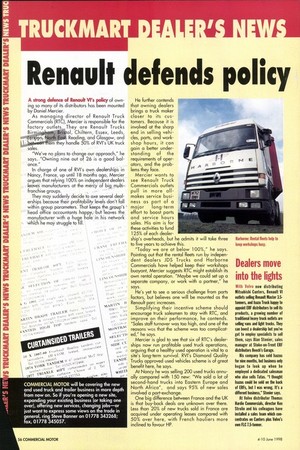Renault defends policy A strong defence of Renault VI's policy
Page 58

If you've noticed an error in this article please click here to report it so we can fix it.
of owning so many of its distributors has been mounted by Daniel Mercier.
As managing director of Renault Truck Commercials (RTC), Mercier is responsible for the factory outlets. They are Renault Trucks Birmingham, Bristol, Chiltern, Essex, Leeds, London, NoglItast, Reading, and Glasgow, and between them they handle 50% of RVI's UK truck sales.
"We've no plans to change our approach," he says. "Owning nine out of 26 is a good balance."
In charge of one of RVI's own dealerships in Nancy, France, up until 18 months ago, Mercier argues that relying 100% on independent dealers leaves manufacturers at the mercy of big multifranchise groups. They may suddenly decide to axe several dealerships because their profitability levels don't fall within group parameters. That keeps the group's head office accountants happy, but leaves the manufacturer with a huge hole in his network which he may struggle to fill. He further contends that owning dealers brings a truck maker closer to its customers. Because it is involved at the sharp end in selling vehicles, parts, and workshop hours, it can gain a better understanding of the requirements of operators, and the problems they face.
Mercier wants to see Renault Truck Commercials outlets pull in more allmakes service business as part of a major long-term effort to boost parts and service hours sales. His aim is for these activities to fund 125% of each dealership's overheads, but he admits to five years to achieve this. "Today we are at below 100%," he says. Pointing out that the rental fleets run by independent dealers JDS Trucks and Harborne Commercials have helped keep their workshops buoyant, Mercier suggests RTC might establish its own rental operation. "Maybe we could set up a separate company, or work with a partner," he says. He's yet to see a serious challenge from parts factors, but believes one will be mounted as the Renault parc increases. Simplifying their incentive scheme should encourage truck salesmen to stay with RTC, and improve on their performance, he contends. "Sales staff turnover was too high, and one of the reasons was that the scheme was too complicated," he says. Mercier is glad to see that six of RTC's dealerships now run profitable used truck operations, arguing that a healthy used operation is vital to a site's long-term survival. RVI's Diamond Quality Trucks approved used vehicles scheme is of great benefit here, he says. At Nancy he was selling 200 used trucks annually compared with 150 new: "We sold a lot of second-hand trucks into Eastern Europe and North Africa", and says 95% of new sales involved a part-exchange. One big difference between France and the UK is that buy-back deals are unknown over there. Less than 20% of new trucks sold in France are acquired under operating leases compared with 50% over here, with French hauliers more inclined to favour HP. it will take three




















































































































